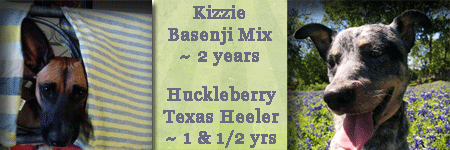Good Thing to Remember!
We pass this out in a handout in some of the volunteer classes we teach at the shelter. I just thought I'd post it here because its a good thing for people to read - especially first time dog owners! And hopefully it will help some people understand their dogs better 
THINK LIKE YOUR DOG & SEE WHAT YOUR DOG SEES
John Fisher on training a dog to retrieve (from his book "THINK DOG")
Step 1: I told him to "sit" alongside me. When he did not obey immediately, I pulled up on his lead and choke chain and pushed down on his haunches.
I thought: I'm teaching him to sit.
The dog thought: I don't like that sit word; it means he's going to push me about.
Step 2: I told him to "stay" and threw the dumb-bell. When he went after it, I checked him firmly and repeated the word "stay".
I thought: I'm teaching him not to go until I tell him.
The dog thought: He doesn't want me to go after the dumb-bell.
Step 3: I told him to "fetch it" and ran with him on the lead to where it had landed.
I thought: I'm teaching him he can go for it now.
The dog thought: Now I'm really confused. He just said don't get the dumb-bell.
Step 4: I pointed to the dumb-bell and told him to "hold it". When he picked it up, I ran backwards gently tugging on the lead to get him to follow me.
I thought: I'm teaching him to pick it up and bring it back.
The dog thought: I must be allowed it; I'll pick it up. Oh no, he's pulling me away again. I had better drop it.
Step 5: He dropped it. I told him "No", put it in his mouth, and held his jaws together telling him to "hold it".
I thought: I'm teaching him not to drop it.
The dog thought: Now he seems to be getting cross. As soon as he lets me spit it out, I promise never to chase it again.
John Fisher on Recalls:
When you call your dog at home, it is generally to feed it, to put its lead on, to take it out for a walk, or to show it that you have dropped some food on the kitchen floor and you want it to clean it up. In fact, we rarely call our dogs to us at home just for the sake of calling them; it is usually a specific reason, and in most cases it is rewarding to the dog. As a result, few people have recall problems at home.
In the local park, however, it is a completely different matter. You walk around the park with your dog running free, playing with other dogs, chasing squirrels, rooting though the rubbish bins whilst you walk about, lost in your own thoughts. At the park gates, you take the lead out of your pocket and then call the dog to take it home. It is not surprising that so many dogs take one look and then head in the opposite direction. At which point you say to yourself, 'I must get that dog trained'.
You have trained it. You have successfully trained it not to come back to you. How? Because the dog quickly learned that not coming to you is rewarding: it gets a longer walk. Coming to you is unrewarding: it gets to go home.
Alyson
Shiloh, Reece, Lolly, Skylar
and fosters Snickers, Missy, Magic, Merlin, Maya







 Reply With Quote
Reply With Quote






Bookmarks